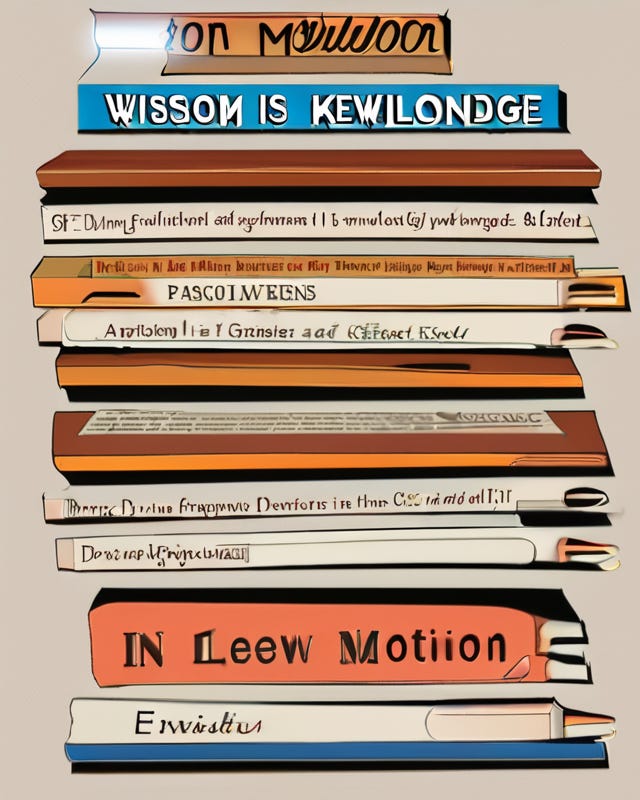Best of the Month (September 2023)
"Wisdom is Knowledge in Motion": Brief, Insightful and Pragmatic!
'The Contrarian' (special edition)
“A contrarian isn’t one who always objects — that’s a conformist of a different sort. A contrarian reasons independently, from the ground up, and resists pressure to conform.” Naval Ravikant Welcome back to “Sebastian’s Leadership Reflections” September 2023, year two!
Pearl of Wisdom
I have observed leaders rise and fall in the crucible of experience. The true measure of a contrarian leader is not in how quickly makes judgment calls, but in the depth and freedom of thought that precedes them. If you aspire to lead effectively in -eternally- unpredictable times, don’t simply echo the popular sentiment; instead, ask, "What important truth do very few people agree with me on?" This question is not for the faint of heart; it requires both brilliance and courage—two commodities short in supply. Remember, it's not about taking sides in a well-shaped debate; it's about seeing what others fail to see and having the courage to stand alone. You won't find inspiration in the latest leadership text or in the trending news but in books of enduring wisdom, where you dig for gold to strengthen your leadership. Exercise discernment, be cautious of expert words that replaces critical thinking, and above all, know which hills you are willing to die on. It's not just about being a leader; it's about the transformative journey of becoming one.
Brilliant thinking is rare, but courage is even rarer. Choose wisely, lead bravely.
Embracing duality: the leadership constant!
“The test of a first-rated mind is the ability to hold two opposing thoughts at the same time while still retaining the ability to function.” F. Scott Firzgerald Dear readers, welcome to another edition of “Leadership Reflections” I work to foster a community of forward-thinking individuals who seek the path to excellence in leadership, no matter if you …
Pearl of Wisdom
Imagine leadership as the mastery of walking a tightrope between two opposing worlds without ever losing balance. This is what embracing cognitive dissonance is about: the ability to hold two conflicting beliefs in your mind and still think clearly. True leaders master this art, effortlessly juggling short-term goals and long-term visions, navigating moral dilemmas, and balancing tradition with innovation. They understand that embracing contradictory thoughts fuels creativity, strengthens decision-making, and fosters adaptability. They know how to build strong relationships, challenge assumptions, and seek new perspectives. Embracing cognitive dissonance acts as a catalyst for a leader to become an architect (not just an agent) of transformation. So, remember, the mark of a great leader is the ability to hold opposing thoughts while still shining the light of reason on the way forward.
Coaching Moment
Balancing Act: Reflect on your ability to balance short-term goals with the progress of the roadmap towards your long-term vision. Can you provide examples?
Cognitive Flexibility: How do you approach situations where there are conflicting viewpoints or contradictory ideas in your team? Can you think of a time when you effectively navigated such a scenario led to better decision-making or to innovation?
Embracing Transformation: Can you think of a situation where you decided to venture into new territory with conviction despite not having all the data? How did this impact your leadership? How did you navigate change management?
Adversity Quotient A.Q.
“When everything seems to be going against you, remember that the airplane takes off against the wind, not with it.” Henry Ford Welcome to another edition of “Sebastian’s Leadership Reflections” Today it’s about the adaptation and response to adversity, core to building resilience, through the concept of the
Pearl of Wisdom
In the cockpit of life and leadership, your Adversity Quotient (AQ) is as important, if not more critical, as your IQ and EQ. Picture yourself piloting through challenges; the "takeoff" needs headwinds, those tough moments that push against you but ultimately lift you higher. Those headwinds represent the stretch, the struggle that builds your resilience and prepares you for the trip ahead. Once airborne you’ll need tailwinds to propel you forward, you’ll seek them, but remember that the landing, the return to stability, will also requires a headwind to slow things down and ground you safely. ‘Hubris’, the illusion that you're invincible, can be your downfall. You will find the instruments for building resilient leadership in your CORE: Control, Ownership, Reach, and Endurance. They will help you navigate with wisdom. Embrace adversity as your co-pilot, not your adversary, and you’ll find that the your limits are not the limit, they are just the beginning.
Coaching Moment
Given the profound insights from the concept of Adversity Quotient (AQ) along with the metaphor of flight and leadership, how would you reframe a current organizational challenge you're facing as an opportunity for transformation, and which specific C.O.R.E. dimension—Control, Ownership, Reach, and Endurance—do you need to focus on most to ensure a successful "takeoff," "cruising altitude," and "safe landing"?
Amor Fati
“A blazing fire makes flame and brightness out of everything that is thrown into it.” Marcus Aurelius Welcome to a new edition of “Sebastian’s Leadership Reflections,” today we pay tribute to Stoic philosophy with a reflection on a profound concept known as
Peal of Wisdom
Stoic philosophy introduces us to "Amor Fati" – a love for one's fate. This ancient Greek principle signals us to embrace life's every turn, be it difficult or joyous, as a part of our destined journey. Every event, setback, or triumph has a lesson, a purpose. It's not about passive acceptance but about actively choosing our response, having the wisdom to turn even adversities into opportunities for growth. Friedrich Nietzsche saw this as a call to live without regrets, to cherish every moment as if it would recur eternally. What if that particular moment would be the only one to be lived eternally? What would you do? As leaders, embracing Amor Fati can be transformative. It fosters resilience, adaptability, and a positive outlook. Remember the words of Marcus Aurelius: "Accept the things to which fate binds you... but do so with all your heart." In leadership and in life, it's not just about facing our destiny but passionately embracing it, learning from it, and leading with it.
Coaching moment
How will you reflect on and embrace the philosophy of 'Amor Fati' to transform your approach to challenges, enabling you to lead not just with resilience and adaptability but with a deep sense of positivity that turns every setback into a stepping stone for growth?
Great leaders are always optimistic because of this principle, not because they lack realism. This deep sense of optimism cannot be faked or acted, it has to be deeply lived out of conviction. Only this way the people who follow you will believe and act on your call to action.
“Lead yourself, Learn to live. Lead others, Learn to Build.”
If you enjoyed reading this post consider subscribing to the newsletter for free, joining the community and sharing your thoughts.









